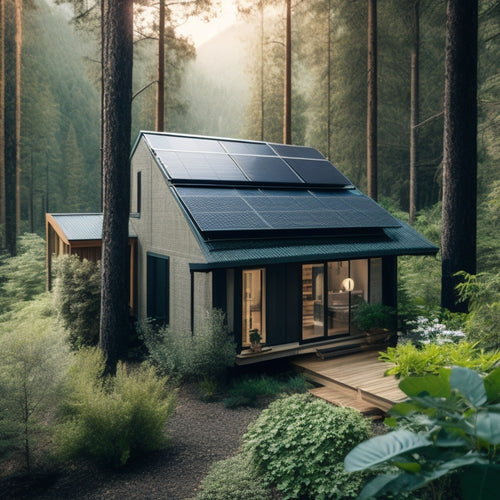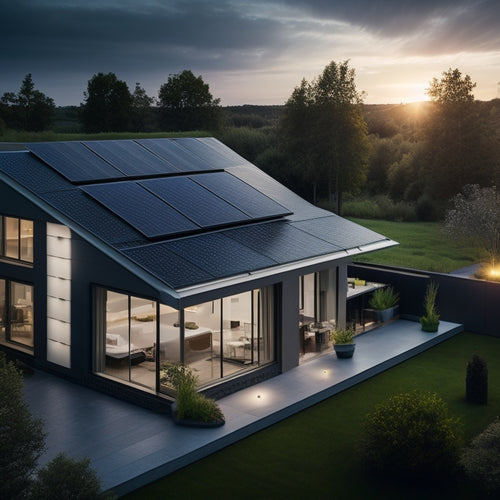
Installing Solar Panels for Home Power
Share
Installing solar panels for home power is an effective way to reduce your energy bills and environmental impact. You can save thousands over time while enjoying energy independence and stability against rising costs. By choosing the right solar panel type and understanding your energy needs, you optimize performance and maximize savings. Financing options and incentives like federal tax credits make the shift more accessible. Plus, solar energy helps decrease your carbon footprint, promoting sustainability. If you're curious about specific system components or want to strategize for your unique situation, there's plenty more to investigate.
At a Glance
- Assess your energy needs and conduct an energy audit to determine the appropriate solar panel system size for your home.
- Explore financing options, such as low-interest loans and leasing agreements, to make solar installations more affordable.
- Research available federal, state, and local incentives to maximize savings on solar panel installation costs.
- Choose the right type of solar panels and inverters to ensure optimal energy production and efficiency.
- Consider net metering programs to earn credits on your utility bills for excess energy generated by your solar system.
Cost-Effective Energy Solution
Investing in solar panels can greatly reduce your energy bills over time, providing long-term savings that can offset your initial costs.
By switching to solar energy, you also contribute to a cleaner environment and reduced carbon footprint, addressing rising energy costs and environmental concerns energy independence benefits.
Plus, you can take advantage of various incentives and rebates that make this energy solution even more affordable.
Long-Term Savings Benefits
Over the lifespan of a solar panel system, homeowners can save thousands of dollars on energy bills, making it a highly cost-effective energy solution. By investing in solar panels, you're not just reducing your monthly expenses; you're also gaining independence from traditional energy sources.
As energy prices continue to rise, your solar system can provide stability and predictability in your energy costs.
When you investigate financing options, you'll find various plans that make the initial investment more manageable. Many homeowners can take advantage of low-interest loans or leasing agreements, allowing you to spread out the costs while still enjoying immediate savings on your energy bills.
The installation process, while detailed, is designed to optimize your roof's potential for energy production. Once your solar panels are up and running, you'll likely notice a significant reduction in your utility bills, often recouping your initial investment within a few years.
Ultimately, shifting to solar power isn't just about saving money; it's about enabling yourself and taking control of your energy future.
Seize this opportunity for long-term savings and energy independence today.
Available Incentives and Rebates
Taking advantage of available incentives and rebates can greatly improve the cost-effectiveness of installing solar panels. You'll find that federal tax credits provide a significant financial advantage, allowing you to deduct a percentage of your solar installation costs from your federal taxes. This can substantially reduce your upfront investment, making the switch to solar more accessible and appealing.
In addition to federal tax credits, many states offer their own incentives, such as rebates, tax credits, and performance-based incentives. These state incentives can further decrease your overall costs and vary widely depending on where you live. By researching the specific programs available in your state, you can maximize your savings and enhance your return on investment.
Moreover, some local utilities provide additional financial incentives for solar installations, which can further improve your energy independence. By utilizing these opportunities, you're not only investing in renewable energy but also taking control of your energy future.
Environmental Impact Reduction
By installing solar panels, you're greatly reducing your carbon footprint and contributing to a cleaner environment.
Solar energy is a renewable resource that helps decrease reliance on fossil fuels, which can lead to harmful emissions.
Additionally, financial incentives make the changeover to solar energy more accessible, allowing homeowners to save on energy costs while benefiting the planet.
Making this switch not only benefits your home but also plays an essential role in promoting sustainable energy practices.
Decreased Carbon Footprint
Installing solar panels greatly decreases your carbon footprint, making a notable difference in environmental impact. By capturing solar energy, you're not only reducing your reliance on fossil fuels but also actively participating in essential sustainability practices. Each kilowatt-hour of solar power you generate translates to fewer greenhouse gas emissions compared to traditional energy sources.
Moreover, using solar panels can greatly contribute to your energy independence. You'll rely less on external energy suppliers, which often exploit non-renewable resources that contribute to pollution and climate change. This independence enables you to take control of your energy usage and aligns with a growing movement towards environmentally conscious living.
As you install solar panels, you're choosing a path that prioritizes both personal freedom and environmental responsibility. You're not just saving money on energy bills; you're also investing in a cleaner, healthier planet for future generations.
Renewable Energy Source
Utilizing solar energy not only helps reduce your carbon footprint but also positions solar panels as a leading renewable energy source. As you consider this shift, it's crucial to understand the broader impact of solar energy innovations and renewable energy policies on your environment.
Here's a quick comparison of solar energy with other energy sources:
| Energy Source | Environmental Impact | Cost-Effectiveness |
|---|---|---|
| Solar Energy | Low | High long-term savings |
| Wind Energy | Low | Moderate savings |
| Fossil Fuels | High | Often low upfront cost |
By choosing solar, you're not just opting for a sustainable solution; you're also aligning with progressive renewable energy policies that promote cleaner alternatives. These policies often provide incentives, making solar installations more accessible and financially viable.
Your decision to install solar panels enables you to take control of your energy consumption. You'll contribute to a cleaner planet while enjoying the freedom of self-sufficiency. Welcome the future, support renewable energy, and make a significant difference in your life and the environment.
Key Components Overview
To maximize your home's solar energy potential, understanding the key components is vital.
You'll encounter various solar panel types, each with unique efficiencies and benefits, along with inverters that convert solar energy into usable electricity.
Additionally, selecting the right solar battery options is essential for effective energy storage and independence.
Grasping these elements will enable you to make informed decisions for your solar installation.
Solar Panel Types
While choosing the right solar panel type can feel overwhelming, understanding the key components can simplify the decision.
You'll encounter various options, including monocrystalline panels, known for their high efficiency and long lifespan. They're perfect if you want maximum power from a limited roof space.
Polycrystalline panels, on the other hand, are more affordable but slightly less efficient. If aesthetics matter, consider constructing integrated photovoltaics, which blend seamlessly with your home's design.
Thin film technology offers flexibility, making it ideal for unconventional surfaces, while bifacial solar panels capture sunlight from both sides, enhancing energy production.
The choice of installation methods can also affect the aesthetics; flexible solar panels can be laid out in creative ways that traditional panels can't.
When evaluating solar panel efficiency, remember that higher efficiency translates to more savings and greater freedom from utility bills.
Each type has its unique advantages, so think about your energy needs, budget, and lifestyle.
Inverter Functionality Explained
An inverter plays an essential role in converting the direct current (DC) generated by your solar panels into alternating current (AC), which is what your home appliances use.
Understanding inverter types—such as string inverters, microinverters, and power optimizers—can help you choose the right system for your energy needs. Each type has unique advantages; for instance, microinverters offer better performance in shaded conditions, while string inverters tend to be more cost-effective for larger installations.
In addition to selecting the right inverter, regular inverter maintenance is vital to guarantee peak performance and longevity. This includes checking connections, inspecting for any signs of wear or damage, and confirming that the inverter is free from dust and debris.
Selecting Based on Energy Needs
To effectively select solar panels, you need to start by evaluating your energy consumption.
Understanding how much energy you use daily will help you calculate the required capacity for your solar system. This step guarantees that you invest in the right system to meet your specific energy needs efficiently.
Additionally, prioritizing high-efficiency solar panels can greatly enhance your energy production.
Assessing Energy Consumption
Comprehending your home's energy usage is crucial when selecting the appropriate solar panel system. Start by performing an energy audit to obtain a clear representation of your current consumption. This process involves reviewing your utility bills, recognizing your usage patterns, and determining which appliances utilize the most power.
By identifying these key areas, you can make informed choices about how much energy you need to produce. For example, if you observe that your heating and cooling systems use a significant portion of your energy, you might prioritize solar panels that can offset that specific demand.
Furthermore, understanding your consumption patterns allows you to evaluate future energy requirements, such as introducing electric vehicles or upgrading appliances. This foresight guarantees that your solar system can adapt to your lifestyle changes, giving you the freedom to utilize renewable energy without compromising on comfort or convenience.
Lastly, remember that selecting a solar panel system isn't just about immediate savings; it's about equipping yourself with energy independence. Invest the time to assess your energy consumption, and you'll be on the right path to making a sustainable choice for your home.
Calculating Required Capacity
Once you have a clear grasp of your energy consumption, the next step involves calculating the required capacity of your solar panel system. This process, often referred to as solar panel sizing, guarantees you're utilizing enough sunlight to meet your needs.
Start by evaluating your daily energy usage, typically measured in kilowatt-hours (kWh).
Next, obtain energy generation estimates based on your location, as sunlight availability varies. Use this data to determine the total capacity in watts you'll require. For instance, if your home consumes 30 kWh daily, and your area receives about 5 hours of sunlight daily, you'll need a solar panel system capable of generating 6 kW.
To make it easier, divide your total daily kWh by the average sunlight hours. This calculation helps you pinpoint the size of the solar panel array necessary for your energy independence.
Higher Long-Term Savings Potential
When you install solar panels, you can greatly reduce your electricity bills over time.
By utilizing the sun's energy, you'll generate your own power, which means less reliance on your utility provider and lower monthly costs.
This not only enhances your savings but also increases your home's overall value as energy prices continue to rise.
Reduced Electricity Bills
By installing solar panels, you can greatly reduce your electricity bills and enhance your long-term savings potential. Solar energy enables you to utilize the sun's abundant power, considerably cutting down on your reliance on traditional energy sources. As you produce your own electricity, you'll notice a marked decrease in monthly energy expenses.
With net metering options available, any extra power you generate can be fed back into the grid, earning you credits on your utility bill. This means that not only will you save on your current energy costs, but you'll also benefit from lower expenses during less sunny months. By forming utility partnerships, you can guarantee you're taking full advantage of these savings opportunities.
Moreover, as electricity prices continue to rise, your investment in solar panels becomes increasingly beneficial. You're not just reducing your bills; you're also protecting yourself from unpredictable energy costs in the future.
Embracing solar energy isn't just a financial decision; it's a step toward energy independence. By going solar, you're claiming your freedom from rising utility prices and gaining control over your energy destiny.
Frequently Asked Questions
What Permits Are Required for Installing Solar Panels at Home?
You'll need to check local zoning regulations and obtain necessary electrical permits before proceeding. Ensuring compliance not only avoids fines but also enables you to maximize your freedom to utilize renewable energy efficiently.
How Long Does the Installation Process Typically Take?
The installation timeline typically varies from one to three days, depending on factors like system size, site readiness, and weather. Knowing these factors helps you prepare, ensuring a smooth process towards your energy independence.
Will Solar Panels Work During Cloudy or Rainy Days?
Imagine a garden thriving despite occasional clouds; solar panels still capture energy during cloudy days, though their efficiency dips. With varying cloud coverage, you'll still generate power, embracing freedom from reliance on traditional energy sources.
What Maintenance Is Required for Solar Panel Systems?
To guarantee your solar panel system runs efficiently, you'll need regular solar panel cleaning and inverter maintenance. These tasks keep your system performing at its best, maximizing energy production and ultimately granting you greater freedom in energy independence.
Can I Install Solar Panels Myself, or Hire a Professional?
You can choose DIY solar installation for flexibility and savings, but hiring a professional guarantees safety and efficiency. Weigh the benefits of your skills against the intricacies involved before making a decision.
Explore More
In summary, installing solar panels for your home not only cuts energy costs but also plays an essential role in reducing your carbon footprint. Remember, "A penny saved is a penny earned." By investing in solar technology, you're setting yourself up for greater long-term savings while contributing to a healthier planet. Don't wait for the future; take the leap today and utilize the power of the sun to energize your home sustainably.
Related Posts
-

Renewable Energy Solutions to Reduce Your Carbon Footprint
To reduce your carbon footprint, adopting renewable energy solutions is key. Using solar panels or wind turbines can ...
-

Off Grid Solar Batteries
As you shift to off-grid living, you'll rely on high-performance solar batteries to store excess energy generated by ...
-

Home Solar Battery
You're opting for a home solar battery that allows you to utilize the power of the sun during the day and use it at n...


